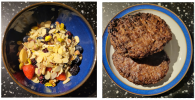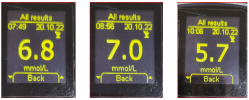smc4761
Well-Known Member
- Messages
- 1,042
- Type of diabetes
- Type 1
- Treatment type
- Insulin
Hi all, hope you are all doing well
As the colder weather is about to come in, its time to go back to my favourite breakfast, porridge. Reading about on internet I am getting conflicting information about soaking the oats overnight. The main consensus is to soak overnight.
My question from there is once they are soaked overnight, do I keep the water the oats soaked in and cook from there. Or should the water be discarded, and fresh water added.
Thanks
As the colder weather is about to come in, its time to go back to my favourite breakfast, porridge. Reading about on internet I am getting conflicting information about soaking the oats overnight. The main consensus is to soak overnight.
My question from there is once they are soaked overnight, do I keep the water the oats soaked in and cook from there. Or should the water be discarded, and fresh water added.
Thanks



